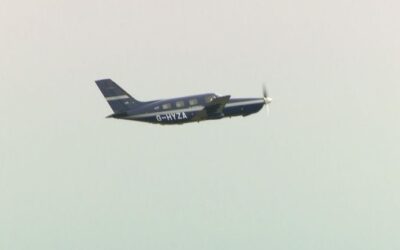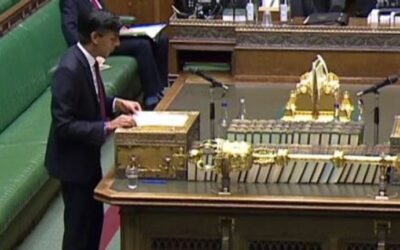The world’s first hydrogen-powered commercial aircraft has taken to the skies above Bedfordshire.
The only thing that the six-seater Piper M-class plane emits is water vapour – and ZeroAvia, the company behind the technology, says its aim is to make hydrogen planes available commercially in three years.
“What we’re doing is replacing fossil fuel engines with what’s called hydrogen electric engines,” ZeroAvia founder and chief executive Val Miftakhov told Sky News.
Image: The only thing that the six-seater Piper M-class plane emits is water vapour
“We also have a fuelling infrastructure set up that ensures zero emission production of hydrogen itself.”
A prototype plane with this type of engine has flown before, but the company says this is the first time that a commercially available aircraft has taken to the skies using hydrogen power.
Advertisement
ZeroAvia says the science is already there for a long, zero-emissions flight by the end of this decade.
But existing airport infrastructure is designed to accommodate gas-guzzling jets, and introducing hydrogen aircraft more widely would mean ground operations would have to be overhauled too.
More from Science & Tech
“It’s not just a question of putting hydrogen-based aeroplanes and getting them to work, we need the infrastructure on the ground to support everything,” said David Gleave, aviation safety investigator and researcher at Loughborough University.
“We have to work out how to refuel these aeroplanes because existing infrastructure won’t work and we have to work out other things such as the fire and rescue requirements for the aeroplane, so there’s quite a lot of work to do but certainly it’s very exciting going forward.”
:: Subscribe to the Daily podcast on Apple Podcasts, Google Podcasts, Spotify, Spreaker
The UK government is supporting the project as part of its Jet Zero Council initiative, which is aimed at making net-zero emissions flights possible in the future.
Ministers hope it will bring economic benefit to Britain, even as the world faces a pandemic which has crushed the airline industry.
“There’s also an opportunity, as we build back, to make sure that we’ve got environmental credentials at the heart of this. This is world-beating technology which has an economic opportunity for Britain as well as answering the global climate change challenge,” aviation minister Robert Courts told Sky News.
After Thursday’s 20-minute flight, ZeroAvia is working towards a 250-mile flight out of an airfield in Orkney.
Mr Miftakhov says the technology is safe, and people will be able to fly without feeling guilty about damaging the environment.
He hopes it won’t be too long until there are paying passengers on board.








